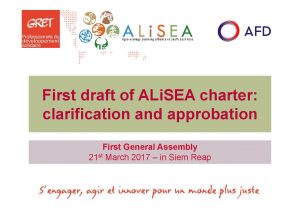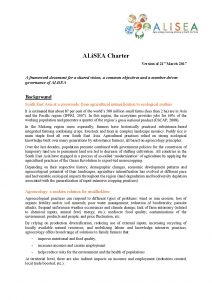
ALiSEA Vision
An increased credibility and visibility of agroecology practices at family farmers, consumers and policy makers level spearheads the redesigning of the landscapes, the livelihoods and the mindscapes in the Mekong Region. Such regional agroecology transition supports the emergence of healthy and resilient food systems and the creation of innovative and fulfilling jobs for the rural youth while sustainably preserving natural resources.
ALiSEA Mission
ALiSEA is a network of Agroecology practitioners and supporters (sharing and supporting common goals on AE) that actively engages its members into information/knowledge sharing and vibrant collective actions promoting an AE transition, and providing visible benefit for all participants. The network intends promoting a unifying agroecology concept for gaining higher visibility and influence, generating public support, and establishing a learning process to facilitate an agroecology transition in the region.
ALiSEA Objectives
- To analyse current regulatory, socio-economic and institutional constraints in order to improve the environmental conditions for agroecology transition and development.
- To share learning from and capitalise on the knowledge and key experiences of different actors (research centres, academia, government agencies, CSO/NGOs, Farmers’ Organizations or Federations, private sector) that are supporting farmers in their agroecological transition.
- To generate, aggregate and disseminate broad Information, Education & Communication materials (video, reports, handbooks) targeting farmers, development practitioners and consumers about agroecology.
- To map outstanding agroecology sites across the Mekong region and to facilitate Farmer to Farmer and multi stakeholder visits.
- To assess local conditions, potentials, and build shared strategies for scaling up successful agroecology practices.
- To encourage / promote agroecology local and healthy food (building consumers’ confidence, private sector engagement and producers’ certification…).
- To foster policy dialogue in order to include agroecology in national / regional strategies.
- To support co-development of performance indicators to assess agroecology impacts and facilitate its field testing.


